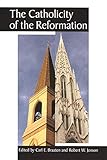The catholicity of the Reformation / edited by Carl E. Braaten and Robert W. Jenson
Material type: TextDescription: x, 107 pages ; 23 cmISBN:
TextDescription: x, 107 pages ; 23 cmISBN: - 0802842208
- 9780802842206
- 270.6 20
- BR307 .C35 1996
| Item type | Current library | Collection | Call number | Status | Date due | Barcode | |
|---|---|---|---|---|---|---|---|
 Books
Books
|
SAIACS General Stacks | Non-fiction | 270.6 B794C (Browse shelf(Opens below)) | Available | 056890 |
Includes bibliographical references
The church as communio / Robert W. Jenson -- The Catholic Luther / David S. Yeago -- The reform of the mass : evangelical, but still Catholic / Frank C. Senn -- The problem of authority in the church / Carl E. Braaten -- The pastoral office : a Catholic and ecumenical perspective / James R. Crumley -- Lutheran pietism and Catholic piety / Robert L. Wilken -- The church is a communion of churches / Günther Gassmann
"As the title of this engaging book suggests, "catholicity" was the true intent of the Reformation. The Reformers did not set out to create what later came to be known as Protestant Christianity. Theirs was a quest for reformation and renewal in continuity with the "one holy catholic and apostolic church" of ancient times. The authors of the essays collected here demonstrate this catholicity of the Reformers and stress the importance of recovering the church's catholic tradition today." "Robert W. Jenson examines communio ecclesiology, describing ecumenical thought on this ecclesiology and developing it in a number of areas. David S. Yeago proposes a new way of reading Luther, suggesting that the shift in Luther's thought actually brought him closer to the church's catholic tradition. Frank C. Senn discusses the Reformers' changes to the order of the mass, which restored the people's participation and regular preaching on biblical texts. Carl E. Braaten explores the problems that arise from the lack of an office of teaching authority in Protestant churches. James R. Crumley examines various perspectives on the office of pastor, seeking to clarify the notion of ministry in the catholic tradition. Robert L. Wilken looks at Pietism, showing that this movement sought to recover lost aspects of medieval spirituality and called for a deepening of personal piety. Finally, Gunther Gassmann discusses the ways in which the church universal is and should be a communion of churches."--Jacket
There are no comments on this title.

